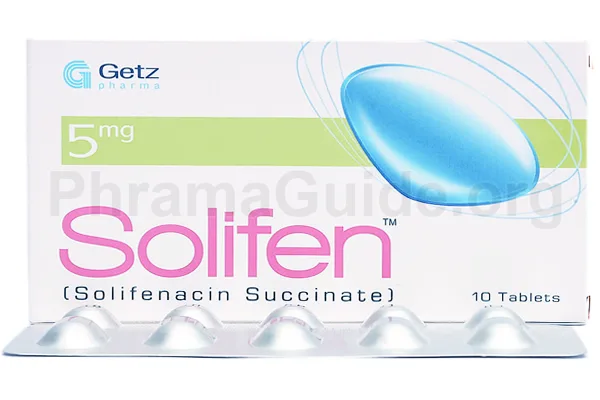Solifen tablet is used to treat overactive bladder syndrome, a condition characterized by urinary urgency, frequency, and sometimes incontinence. Following are some common uses of Solifen Tablet:
- Overactive Bladder Syndrome: Solifen tablet is primarily used to treat overactive bladder syndrome in adults. It helps to reduce the symptoms of urinary urgency, frequency, and incontinence.
- Urinary Incontinence: Solifen tablets may also be used to treat urinary incontinence, which is the involuntary loss of urine.
- Neurogenic Detrusor Overactivity: Solifen tablets may be used to treat neurogenic detrusor overactivity, which is a condition where the nerves that control the bladder are damaged, leading to overactive bladder symptoms.
- Interstitial Cystitis: Solifen tablets may be used to treat interstitial cystitis, a chronic condition that causes pain and discomfort in the bladder and pelvic region.
Off-label Uses of Solifen Tablet
- Hyperhidrosis: Hyperhidrosis refers to excessive sweating, and Solifen has been explored off-label as a potential treatment for this condition. It may help reduce sweating in specific areas, such as the palms of the hands or soles of the feet.

What is Solifen?
Solifen is one of the leading brands of Solifenacin Succinate, manufactured and marketed by Getz Pharmaceuticals (Pvt) Ltd, Pakistan.
Solifen Alternatives : Other Similar Brands
The following are some alternative brands of Solifen and their manufacturers.
- Solcina : Helix Pharma (Pvt) Ltd, Pakistan.
- Fenso : Highnoon Laboratories Ltd, Pakistan.
- Solfy : Sami Pharmaceuticals (Pvt) Ltd, Pakistan.
- Conifa : Searl Pakistan Ltd.
- Urgesin : AGP (Pvt) Ltd, Pakistan.
- Zezitic : Consolidated Chemical Laboratories (Pvt) Ltd, Pakistan.
- Solif : Genix Pharmaceuticals (Pvt) Ltd, Pakistan.
- Solicep : Genome Pharmaceutical (Pvt) Ltd, Pakistan.
- Solicon : Efroz Chemical Industries (Pvt) Ltd, Pakistan.
Solifen : Available Formulations and Strengths
Presently, Solifen is available in Tablets Form.
Solifen Tablets : 5mg and 10mg strengths.
Who Should Not Use Solifen?
Solifen has several contraindications, which means that it should not be used in certain situations due to the risk of serious side effects.
Hypersensitivity: Solifen should not be used in individuals who are hypersensitive to the drug or any of its ingredients.
Urinary Retention: Solifen should not be used in individuals with urinary retention, which is the inability to empty the bladder.
Gastric Retention: Solifen should not be used in individuals with gastric retention, which is the inability of the stomach to empty properly.
Uncontrolled Narrow-angle glaucoma: Solifen should not be used in individuals with uncontrolled narrow-angle glaucoma, a type of eye condition that can cause vision loss.
Severe Hepatic Impairment: Solifen should not be used in individuals with severe hepatic impairment, as the drug is metabolized in the liver and may cause further damage.
Severe Renal Impairment: Solifen should be used with caution in individuals with severe renal impairment, as the drug may accumulate in the body and increase the risk of side effects.
What is the Recommended Daily Dosage of Solifen?
Solifen Dose for Adults with Overactive Bladder Syndrome: One tablet of 5 mg once daily, which may be increased to 10mg tablet once daily after 4 weeks if needed.
Solifen for Children: Solifen is not recommended for use in children under the age of 18.
How Solifen Works?
Solifen is a competitive muscarinic receptor antagonist. It works by selectively blocking the action of acetylcholine, a neurotransmitter that plays a role in the contraction of smooth muscles, including those in the bladder.

Leave A Comment